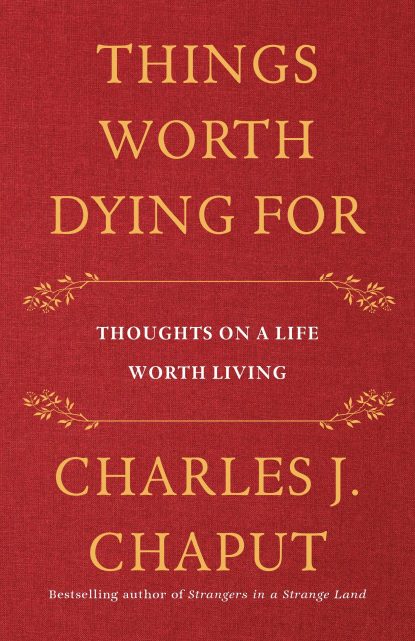
This is the cover of the book “Things Worth Dying For: Thoughts on a Life Worth Living” by retired Archbishop Charles J. Chaput of Philadelphia. (CNS photo/courtesy Henry Holt and Company)
“Things Worth Dying For: Thoughts on a Life Worth Living” by Charles J. Chaput. Henry Holt & Company (New York, 2021). 272 pp, $25.99.
“Memento mori” is in vogue these days, from death doulas to funereal composting to hipster reconsiderations of the industrial death complex. For modern pagans, the well-branded body is a sensible starting point, boosting Instagram feeds curated to assure followers that death can be a fashionable and coolly macabre experience.
It’s striking that many modern death prophets are fairly young or at most, a well-presented middle age, still affable and conversant with the youth culture from which they spring — even as coronavirus re-peoples our media feeds with portraits of grave suffering and death: wasted faces both aged and young hid in webs of breathing masks and hospital apparatus.
Archbishop Charles Chaput’s new book, “Things Worth Dying For: Thoughts on a Life Worth Living,” takes a different starting point and a different tack.
The personal reflections of a septuagenarian about death, the book takes its cue from the practical task of his resignation and retirement, as required by Catholic archbishops on reaching 75.
At this stage, he quips, quoting a friend, dying is a “one-way off-ramp” from the road of life, whose rearview stretch runs much further than the road ahead.
The retired archbishop of Philadelphia’s own rearview stretch — personal, spiritual and intellectual — is warmly intertwined in this series of astute table talks the reader can imagine extending from a dining room to the warmth of a fireplace den, as one might linger after a meal with a grandfatherly friend who, nearing the final decades of his life, is eager to encourage a young friend in how to approach death, life and meaning-making in a culture of irony.
[hotblock]
The irony Archbishop Chaput has in mind, however, isn’t the deconstruction-unto-death of contemporary detachment, but rather, a concept rooted in Greek comedy.
In one of many moments of thoughtful instruction, the archbishop weaves ideas from sources such as classical thought, Thomistic philosophy, the Bible, and film and literature to draw a through-line from “eironea” to Casablanca’s Rick Blaine, brooding over his lost idealism.
Somewhere in the middle, Archbishop Chaput hits on Roger Scruton, highlighting the contemporary philosopher’s belief that Western civilization’s ironic temperament — a pillar Scruton says stands as a pair with forgiveness — is a mode of discernment and acceptance, a Judeo-Christian concept markedly distinct from its distended and sarcastic present-day incarnations.
Archbishop Chaput briefly recounts how his Kansas childhood — an affectionate and stable small-town family life, his parents’ deep Catholic faith, a proud Prairie Band Potawatomi Nation and French Quebecois heritage — nurtured an interior life that primed him to seek a rigorous formation in Western intellectual and spiritual traditions, as offered in his Capuchin Franciscan priestly studies and life.
While he can’t impart the same physical and spiritual rootedness of his own upbringing to generations brought up in a prismatic world of contingent data and virtual relations, he does want to share with us the rich patrimony still percolating under our waning Western culture, as most recently fractured by racism, extremism and pandemic.
As we enter charged conversations on patriotism and nationalism, he wants us to be conversant in Horace, “The Song of Roland,” just-war theory and the bitter honesty of Wilfred Owen’s First World War poem, “Dulce et Decorum Est.” As we encounter our era’s pains of family breakdown and COVID-heightened isolation and loneliness, he wants us to consider how thinkers such as Karl Marx, Friedrich Engels, Auguste Comte, Shulamith Firestone and Wilhelm Reich stand in conversation with theology of the body.
In lively engagement with these kinds of ideas, he proposes, we can close the gap between the dehumanized irony of nihilism and the discerning irony of our Judeo-Christian inheritance — and so make for ourselves a life and a death worth living.
***
Hassan is a writer based in Washington.
PREVIOUS: Latest ‘Crash Bandicoot’ video game is a timely hoot
NEXT: ‘American Oz’ peeks into flawed wizard behind the curtain



Share this story